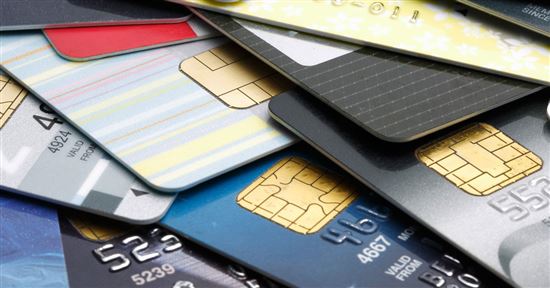23 Sobering Credit Card Debt Statistics
Over 38% of Americans have credit card debt, with an average of $5,331 per person. See more shocking credit card debt stats below. How do you stack up?
 |
Credit cards have definitely simplified how we shop. But using them is often like walking a tightrope. If you don't pay your card in full each month, shaky balances will keep adding up. When you factor in all the interest that will accumulate, you're at risk for making a hard fall.
Stand upright and confident by knowing the facts. These figures are shocking, but understanding them will get you on the road to financial recovery. You want to aim to not be just another statistic.
Here are the brutal facts. Read on for our rundown of credit card debt in the U.S.
CREDIT CARD USAGE
1. What is the total credit card debt in the U.S.?
As of the end of 2016, total revolving debt in the U.S. topped $992.4 billion, according to the Federal Reserve. That's a jump of roughly $151 billion since 2011.
2. How many Americans have at least one credit card?
According to a 2015 Federal Reserve report, 77% of Americans have at least one credit card account. The number of people carrying credit cards differs greatly based on income. Only 59% have 1 or more credit cards among those making less than $40,000 per year, while over 93% of those earning over $100,000 have a credit card.
3. How many credit cards does the average consumer have?
Across adults who own at least one credit card, Americans are carrying 3.4 credit cards on average. Generation Xers tend to have the most credit cards, with an average of 4.5 in their wallets. Millennials tend to have the fewest cards, with an average of 2.4.
4. What percentage of households have credit card debt?
According to data from the Federal Reserve, 38.1% of American households had a credit card balance as of 2013.
5. What is the average credit card debt?
As of the end of 2016, we estimate the average debt per person to be $5,331 for those who own at least one credit card. Across all American adults, the average debt per person comes to $4,094.
6. Are fewer Americans opening credit cards accounts these days?
No. According to the American Bankers Association's Credit Card Monitor November 2016 report, the number of new accounts opened increased by 11% from the previous year.
BALANCES AND PAYMENTS
7. What percentage of people pay their cards in full each month?
About 42% of households are able to pay their credit card balance in full each month according to a Federal Reserve report. This is an increase from previous years, which suggest that Americans are becoming more financially responsible.
8. What percentage of cardholders carry a balance?
The remaining 58% carry a balance. Of those who carry a balance, about 40% say they always pay more than the minimum. But half say that they only make the minimum payment some or all the time. (We always advocate paying your balance when you can; see why paying just the minimum is never a good idea.)
9. What percentage of consumers have less than $1,000 in credit card debt?
In a Gallup poll, 15% of cardholders say they owe less than $1,000. Among all adults nationwide (including those who do not own credit cards), that figure drops to 10%.
10. What percentage of consumers owe more than $10,000?
Some consumers owe amounts in the five figures. Approximately 8% of cardholders say they owe over $10,000 to the credit card companies in a Gallup poll.
11. What's the average credit limit for a new credit card?
Your credit limit influences how much spending power you have. According to the American Bankers Association's Credit Market Monitor report at the end of 2016, the average credit line for a new card was $9,779 for someone with excellent credit. For consumers with subprime credit scores, the average limit for a new card was just $2,472.
12. What's the average credit utilization?
The credit utilization ratio is the amount of credit you have tapped versus your total credit limit. According to Experian's 2016 State of Credit Report, Americans are using 30% of their available credit lines on average. This rate has remained steady for the past several years.
13. What percentage of consumers spend more than 40% of their income on debt?
Your debt to income ratio is a calculation of how much of your income goes toward debt payments each month. As of 2013, 11% of households were spending 40% or more of their pay on credit card debt.
14. What percentage of Americans are delinquent on a credit card account?
This means that the cardholder has failed to pay the minimum amount for 3 consecutive payments. The overall delinquency rate for credit cards was around 1.53% in 2016. This figure is relatively low, but still an increase from the previous year's 1.44%.
CREDIT CARD DEBT BY AGE
15. How deep in debt are seniors?
Americans aged 70 and up tend to have the best credit scores overall, but that doesn't mean they're free of credit card debt. On average, the Silent Generation had $3,780 in credit card debt as of 2016.
16. What's the average debt load for baby boomers?
Baby Boomers (age 52 to 70) are characterized by a “work hard, spend hard” mentality. Unsurprisingly, they also have the highest credit card debt of any age group. For 2016, the average debt came to $6,889.
17. How much debt is Generation X carrying on average?
Generation X (age 35 to 51) grew up during a time when America was losing its status as the most powerful nation in the world. It's the first generation that did not do as well financially as their parents. Generation X comes in a close second in average credit card debt at $6,866 per person.
18. What's the average credit card debt for Millennials?
Millennials (age 22 to 34) tend to have better financial habits, and many avoid credit cards altogether. The ones that use them are keeping their debt levels low for the most part. According to Experian, the average credit card debt for Millennials is $3,542.
CAUSES OF CREDIT CARD DEBT
19. Does being unemployed lead to credit card debt?
When you get laid off and you don't have an emergency fund, plastic may be the only way to fill the gap. In a survey of credit card users by public policy organization Demos, households were 14% more likely to have credit card debt when someone in the home had gone through a recent bout of unemployment.
20. Does health insurance affect credit card debt?
Lack of health insurance is one of the biggest factors that contribute to credit card debt. When families can't cover unexpected healthcare costs, they turn to credit cards for help. Households where at least one member has been uninsured during the past three years are 20% more likely to carry credit card debt according to Demos.
21. Does earning more mean that you have less debt?
Surprisingly no. Making more money doesn't mean you are debt-free. The U.S. Census found that those who earn more also carry more debt. The highest earners (over $100,000 annually) average $10,322 in debt – almost double the average of $5,975 for the lowest earners (under $20,000).
The Survey of Consumer Finances also found that just 20% of households in the lowest income bracket carry debt. But almost 50% of households with income in the 60-90% percentile have credit card debt.
22. Is there a link between education and credit card spending?
Having a college education may make you a little savvier when it comes to credit card use. In the Demos survey, respondents who have earned a degree were 22% less likely to have credit card debt than high school grads.
However, the U.S. Census found that among people who do have debt, those with higher education carry bigger credit card balances. This could be because they have higher earning jobs, which could translate into a higher credit limit.
23. Are people with children more likely to have credit card debt?
There's no doubt that raising children is expensive, and some families are using credit to cover part of the cost. Households with children under age 18 are 15% more likely to have credit card debt than those without kids, according to Demos.
THE BOTTOM LINE
Credit card debt that has built up over time can prevent you from achieving your financial goals, like owning a home or building up your retirement nest egg. If you're stuck in debt and struggling to find your way out, check out our beginner's guide to paying off your cards fast.
Sources and Additional References
- Federal Reserve
- Gallup
- Experian
- TransUnion
- Demos
- US Census
- American Bankers Association
Rebecca Lake is a journalist at CreditDonkey, a credit card comparison and reviews website. Write to Rebecca Lake at rebecca@creditdonkey.com. Follow us on Twitter and Facebook for our latest posts.
Read Next:
